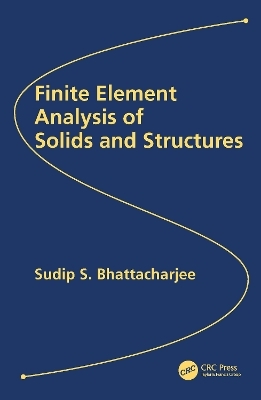
Finite Element Analysis of Solids and Structures
Seiten
2024
CRC Press (Verlag)
978-1-032-04158-2 (ISBN)
CRC Press (Verlag)
978-1-032-04158-2 (ISBN)
This textbook combines the theory of elasticity (advanced analytical treatment of stress analysis problems) and finite element methods (numerical details of finite element formulations) into one academic course derived from author’s teaching, research, and applied work in automotive product development and civil structural analysis.
Finite Element Analysis of Solids and Structures combines the theory of elasticity (advanced analytical treatment of stress analysis problems) and finite element methods (numerical details of finite element formulations) into one academic course derived from the author’s teaching, research, and applied work in automotive product development as well as in civil structural analysis.
Features
Gives equal weight to the theoretical details and FEA software use for problem solution by using finite element software packages
Emphasizes understanding the deformation behavior of finite elements that directly affect the quality of actual analysis results
Reduces the focus on hand calculation of property matrices, thus freeing up time to do more software experimentation with different FEA formulations
Includes chapters dedicated to showing the use of FEA models in engineering assessment for strength, fatigue, and structural vibration properties
Features an easy to follow format for guided learning and practice problems to be solved by using FEA software package, and with hand calculations for model validation
This textbook contains 12 discrete chapters that can be covered in a single semester university graduate course on finite element analysis methods. It also serves as a reference for practicing engineers working on design assessment and analysis of solids and structures.
Teaching ancillaries include a solutions manual (with data files) and lecture slides for adopting professors.
Finite Element Analysis of Solids and Structures combines the theory of elasticity (advanced analytical treatment of stress analysis problems) and finite element methods (numerical details of finite element formulations) into one academic course derived from the author’s teaching, research, and applied work in automotive product development as well as in civil structural analysis.
Features
Gives equal weight to the theoretical details and FEA software use for problem solution by using finite element software packages
Emphasizes understanding the deformation behavior of finite elements that directly affect the quality of actual analysis results
Reduces the focus on hand calculation of property matrices, thus freeing up time to do more software experimentation with different FEA formulations
Includes chapters dedicated to showing the use of FEA models in engineering assessment for strength, fatigue, and structural vibration properties
Features an easy to follow format for guided learning and practice problems to be solved by using FEA software package, and with hand calculations for model validation
This textbook contains 12 discrete chapters that can be covered in a single semester university graduate course on finite element analysis methods. It also serves as a reference for practicing engineers working on design assessment and analysis of solids and structures.
Teaching ancillaries include a solutions manual (with data files) and lecture slides for adopting professors.
1. Introduction to Stress Analysis of Solids and Structures. 2. Strain–Displacement Relationship and Elasticity of Materials. 3. Analysis of Solids Represented by 2D Stress Fields. 4. FEA Model Preparation and Quality Checks. 5. Stress Analysis of Axisymmetric and General 3D Solids. 6. Deformation Analysis of Beams for Axial, Bending, Shear, and Torsional Loads. 7. Analysis of 3D Thin-Wall Structures (Plates and Shells). 8. Multi-Component Model Assembly. 9. Interpretation of Stress Analysis Results for Strength and Durability Assessment. 10. Vibration Frequency Analysis of Structures with FEA Model. 11. Linear Dynamic Response Analysis of Structures. 12. Nonlinear Analysis of Structures.
| Erscheinungsdatum | 14.08.2022 |
|---|---|
| Zusatzinfo | 5 Tables, black and white; 3 Line drawings, color; 224 Line drawings, black and white; 227 Illustrations, black and white |
| Verlagsort | London |
| Sprache | englisch |
| Maße | 156 x 234 mm |
| Gewicht | 625 g |
| Themenwelt | Naturwissenschaften |
| Technik | |
| ISBN-10 | 1-032-04158-7 / 1032041587 |
| ISBN-13 | 978-1-032-04158-2 / 9781032041582 |
| Zustand | Neuware |
| Informationen gemäß Produktsicherheitsverordnung (GPSR) | |
| Haben Sie eine Frage zum Produkt? |
Mehr entdecken
aus dem Bereich
aus dem Bereich
Eine kurze Geschichte | Über die Regeln unseres Lebens
Buch | Hardcover (2023)
Suhrkamp (Verlag)
CHF 47,60
Senses and Movement
Buch | Softcover (2023)
De Gruyter (Verlag)
CHF 125,90


